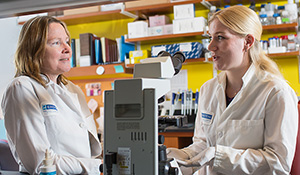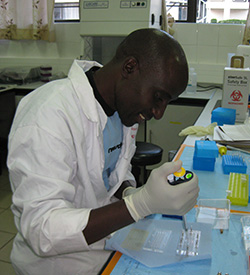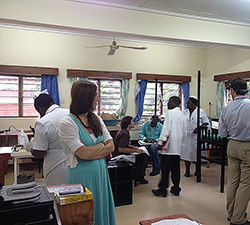

When Graduate School Goes Global
Getting a Global Perspective of Cerebral Malaria
“There is no reason that a Ph.D. can’t do global health research,” said Catherine Manix Feintuch (Ph.D. ’15). Dr. Feintuch, who defended her dissertation successfully this June, completed her thesis work in the laboratory of Dr. Johanna Daily, associate professor of medicine and of microbiology & immunology.

Catherine Manix Feintuch, Ph.D. (at right), and her mentor, Johanna Daily, M.D. Dr. Daily, an M.D. with a Master’s in Epidemiology, noted that many members of Einstein’s faculty are involved in global health research, and “there are opportunities for graduate students to do biomedical research with mentors who do translational work.”
Dr. Feintuch’s thesis centered on immune and genetic factors associated with the progression and severity of cerebral malaria, the deadliest form of the disease. Through Dr. Daily’s longtime association with the Blantyre Malaria Project—a multi-institutional collaboration in Malawi—Dr. Feintuch conducted research that was critical to her thesis.
Roots in Research
Dr. Feintuch’s interest in global health was born in her high-school years, when she read Mountains Beyond Mountains, a biography of Dr. Paul Farmer that described his dedication to improving the health of people in low-income countries. “I was inspired,” she said. And on a church service trip, she visited Haiti, where Dr. Farmer initially focused much of his global health effort.
“Following my experience there, I knew I wanted to help people in low-income countries,” she said. “But I also knew that I didn’t want to become a physician and practice medicine.”
Biomedical research was a different story. “I love science because it’s like solving a puzzle,” she said.
During high school, she placed fourth in the Medicine and Health category of the Intel International Science and Engineering Fair; data from her project contributed to a manuscript published in the Proceedings of the National Academy of Sciences.
As an undergraduate, she entered Einstein’s Summer Undergraduate Research Program and worked in the laboratory of Dr. Tanya Dragic, associate professor of microbiology & immunology. She then worked as a lab technician in the laboratory of Dr. Liise-anne Pirofski, professor of medicine and of microbiology & immunology. She also used that time to complete a certificate in public health.
“By the time I applied to graduate school, I knew I wanted to travel and that I wanted to work in the area of infectious diseases,” Dr. Feintuch said.
The cCLIPSE Program

Dr. Feintuch worked closely with Malawian technician Alex SaidiAs an Einstein graduate student, Dr. Feintuch found the solution she was looking for: the Education Connecting Laboratory Investigation and Population Science at Einstein (eCLIPSE) program. The five-year eCLIPSE program is a novel Ph.D. track in Clinical Investigation for graduate students and M.D.-Ph.D. students in Einstein’s Medical Scientist Training Program who want to train in basic science and public health. The program emphasizes interdisciplinary science and offers global health opportunities. Launched in 2006 through a Clinical and Translational Research award from the National Institutes of Health’s National Center for Advancing Translational Sciences, eCLIPSE also receives support from the Burroughs Wellcome Fund.
She also found a mentor. “Dr. Daily studies malaria, and through her lab there was an opportunity to travel, to do translational research and to study real patients,” said Dr. Feintuch. “After rotating through her lab during first year, I knew it was where I wanted to do my graduate research.”
The Malawi Connection
Funded by a five-year eCLIPSE grant and supported by an Albert Cass Traveling Fellowship, Ms. Feintuch journeyed twice—in early 2013 and early 2014—to the Queen Elizabeth Hospital in Blantyre, Malawi, to research the role of neutrophils, a type of blood cell, on cerebral malaria outcomes in children. There she joined a team of doctors, nurses and researchers who are part of the Blantyre Malaria Project. “Children with cerebral malaria are admitted to the hospital in comas,” Dr. Feintuch explained. “One in five will die, and survivors often sustain complications of their infection that include behavioral disorders and seizures.”

In the clinic, Malawi Neutrophils live for only twelve hours outside of the body and can’t be frozen, said Dr. Feintuch, so researchers wanting to do detailed studies have to be on site. “A blood sample would be taken from the patient upon admission so that it could be studied in detail and correlated with the patient’s outcome—and it didn’t matter what time of day or night,” said Dr. Feintuch.
She and Alex Saidi, a Malawian technician, would receive a text message; “then we would receive the samples and isolate the neutrophils. Our data analysis suggested that neutrophils play a role in the host’s response to infection, and may mediate disease outcomes,” said Dr. Feintuch.
In between Dr. Feintuch’s visits to Malawi, Mr. Saidi traveled to Einstein to learn additional methods and share techniques useful to their studies. Upon her return to Malawi, they isolated platelets, another type of blood cell, to conduct similar analyses that might lend insights into their role in malarial infection.
During both of her visits to Malawi, even though she wasn’t a medical student, Dr. Feintuch also went on rounds at the hospital. ”It was an opportunity to see the faces of the patients instead of them being just columns on an Excel spreadsheet,” she said. “And I appreciated seeing how hard the Malawian doctors and nurses work and how much they care for their patients”—just one of many reasons why Malawi is known as “the warm heart of Africa.”
Dr. Feintuch plans to continue field work on neglected tropical diseases.
Posted on: Friday, September 11, 2015


